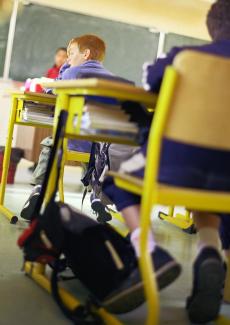
Teachers discussing assessment in preschool
April 8, 2015
This response is by Randi Weingarten, President, American Federation of Teachers.
Assessment related to reaching standards will not be developmentally appropriate, and results may be misused.
I sat down with a group of prekindergarten educators in New York City recently to talk about how they assess how their students are doing. The conversation began slowly. A few mentioned that they feel overwhelmed by the many different assessments they are asked to use; others noted how they feel pressure to be sure that these assessments show that their kids are ready for kindergarten.
“We know that these kids have to be at a certain level in kindergarten,” said Zara Ziff, a teacher for the past 11 years. “Every time we turn around, we’re assessing them.”

Then the conversation turned to play-based learning. It was as if someone had flipped a light switch. Around the table, faces lit up—voices lifted in animated, excited tones. To see the joy flooding the room made me think of how much joy these teachers infuse in their students when they are able to guide them with developmentally appropriate activities that meet them where they are.
“For some of them, the only way they know how to express themselves right now is through playing,” said Angela Russell, a teacher for the past 10 years.
“They express themselves without fear,” said Norah Edwards, a 29-year veteran teacher.
Play helps their students learn how to communicate, how to work in teams, how to solve problems. And it helps educators understand what their students are learning.
“Play is so important because not every kid is going to want to come in here and just start drawing and writing and learning numbers. Some kids come in and don’t even know how to behave when their parents aren’t around, and they get scared because their moms aren’t there,” said Gyasi Daniel, a pre-K para-educator. “When you’re playing with them, they get comfortable, they get adjusted to school—and they say, I can be myself here. That’s what is really important about pre-K.”
Years of research shows that the best way to assess the progress of our early learners is through the expertise of teachers who know how to observe and interpret young children’s activities and behavior. Yet early childhood educators are being forced by states across the country to use what they perceive as developmentally inappropriate practices in these crucial early learning years under the guise of needing to prepare for K-3 Common Core assessments.
According to those I spoke with in New York City, play-based learning should comprise up to 60 percent of the school day. Instead, they are finding that testing-based assessments are taking up more and more of their time. Angela noted that she is currently using three assessments with her students.
The AFT is working to help educators like Zara, Angela, Norah, and Gyasi infuse a joy of learning in our youngest learners by keeping standardized tests out of our pre-K through second-grade classrooms. At the same time, we are working to ensure that early childhood educators are included in all conversations about the rollout and implementation of the Common Core—to ensure that the needs of our youngest learners are addressed.
We believe that assessments should be used to help teachers take an inventory at the launch of the school year to find out where their students are starting from, so they can then shape their instruction to get them where they need to go, as Norah suggested.
Ultimately, we need to put our teachers in the driver’s seat and help them to infuse our youngest learners with a lifelong love of learning—and we need to ensure that any and all assessments don’t get in the way of that.
“You want all children to have a love of learning,” said Karen Alford, vice president for elementary schools of the United Federation of Teachers. “It begins here in pre-K. That’s why play is so important. The hands-on experiential learning is so valuable. They will get to the pencils and the bubble test. That will come. But this is the foundation.”
AFT President Randi Weingarten visited PS 184 in Brooklyn to attend a launch event for a new toolkit for staff and families: Transitioning to Kindergarten. For more information, visit the AFT’s early childhood Web page.
About NIEER
The National Institute for Early Education Research (NIEER) at the Graduate School of Education, Rutgers University, New Brunswick, NJ, conducts and disseminates independent research and analysis to inform early childhood education policy.
